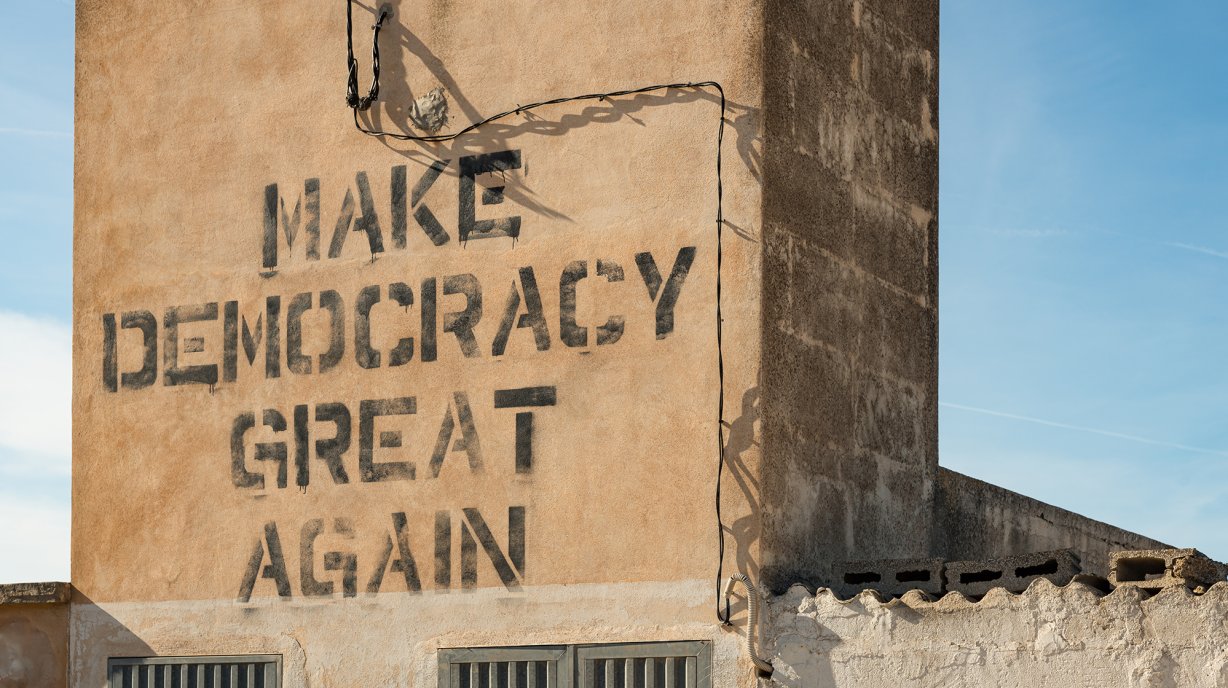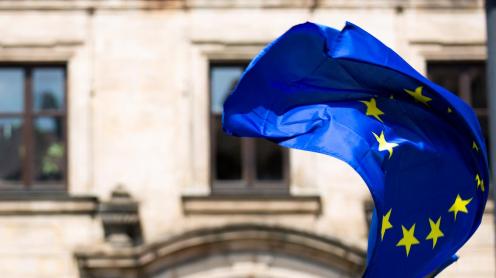From political commitment to populist mechanics

“Make Democracy Great Again” written on a building. Photo by Andreas Gruhl / stock.adobe.com
Why are populist speeches so appealing? Why do rigid, sometimes unrealistic promises appear more credible than nuanced commitments? A recent study analyses the strategic mechanisms of a political system hampered by a crisis of trust in institutions.
On 6 January 2021, just hours before the assault on the Capitol, Donald J. Trump roused his supporters by identifying a “corrupt" elite as the enemy - an elite, deaf to the interests of the “real people…, that built this nation".
This rhetoric encapsulates the essence of populism: a sharp opposition between “the people” and a powerful minority, “the elite”, who are cast as scapegoats. Such discourse is often accompanied by attacks on checks and balances—particularly the press and the judiciary.
The populist wave is global. From the United States to Europe, and across Latin America, populism is on the rise. But how can this momentum be explained?
According to economist Massimo Morelli, a specialist in political economy, and his colleagues, one key factor is at play: the collapse of trust in institutions.
As trust erodes, populism grows
The authority of public institutions relies on the trust of citizens. This belief in their moral and professional integrity underpins adherence to rules and forms the basis of institutional legitimacy. Without trust, institutions falter.
In February 2024, only 22% of Americans reported trusting the federal government — a historic low. This mistrust also extends to the judiciary, the education system, and the media. It stems both from economic insecurity (globalisation, financial crises, automation) and from a sense of cultural decline or displacement.

Photo by Moopingz IA generated / stock.adobe.com
As this trust erodes, voters increasingly demand certainty. In this sense, it is not the leaders who initiate populism, but the voters who demand it — as if expressing a new collective state of mind. Faced with broken trust, voters favour firm commitments, simplified messages, and no-nonsense politics: clear, immediate promises, without shades of grey.
In this context, the most "committed" candidates — in the sense of offering firm, uncompromising pledges — are the ones who stand out. For Massimo Morelli and his colleagues Luca Bellodi, Antonio Nicolò and Paolo Robert, this phenomenon gives rise to what they call a “politics of commitment”: a politics in which compromise is seen as betrayal and counter-powers are viewed with suspicion. The aim is to break away from a system “captured” by elites, by explicitly pledging to act for the people.
Populism and social media
1If there is one space where populist discourse thrives, it is on social media. Unlike traditional media, platforms such as X (formerly Twitter), TikTok, Facebook and others allow individuals to speak freely, without filters or intermediaries: the candidate addresses the people directly.
Populist politicians are, in fact, highly active on social media. In France, for example, MPs from La France Insoumise are responsible for 31% of parliamentary posts on Twitter-X, despite making up only 12% of the National Assembly. The Rassemblement National generates 24% of posts with 21% of MPs. A similar pattern can be seen on TikTok, the social network favoured by younger users.
- 1
Postill, J. (2018). Populism and social media: a global perspective. Media, Culture & Society, 40(5), 754-765.
For researchers specialising in data analysis, including economists, social media has become a subject of serious study. Analysing 5.9 million tweets from 3,579 candidates for the US Congress between 2012 and 2020, Massimo Morelli and his colleagues found that candidates adapt their rhetoric to the level of public mistrust.
The lower the trust, the more likely candidates are to use populist language, multiply promises, and take aim at the elite. The effect is mirrored among voters: support for populist candidates rises significantly when trust is low; in other words, commitment and populism form a strategic pairing.
Photo by Rawpixel.com / stock.adobe.com
A double-edged sword
But this strategy of firm commitment has a downside. By casting suspicion on independent institutions and checks and balances, it increases democratic vulnerability. Moreover, in order to appear reassuring, candidates box themselves into rigid promises. This hardening of public action limits the government’s ability to adapt or negotiate.
Recently in France, Marine Le Pen was undone by her own rhetoric, illustrating the limits of this strategy. Once a staunch advocate of banning convicted officials from holding office, she denounced her own conviction as “madness (…) flagrantly undermining the sovereignty of the French people” – a telling inconsistency.
A reversible trend?
Ultimately, this study invites us to look beyond the label of “populism” to understand a deeper mechanism: the transformation of the democratic bond as trust erodes. The more that trust declines, the more voters demand firm commitments and accept divisive rhetoric.
But how can trust be restored without tipping into insidious authoritarianism? How can institutions be rethought in a way that restores legitimacy, without lapsing into technocracy or denial?
At its core, democracy rests on a fragile moral contract: the belief that our representatives act — if not always successfully, then at least sincerely. Without that belief, even the firmest promises are no solution; they become a headlong rush into uncertainty.













